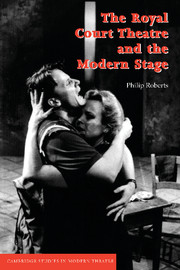Book contents
- Frontmatter
- Contents
- Foreword by Max Stafford-Clark
- Preface
- Acknowledgements
- List of abbreviations
- Biographical notes
- Introduction: abortive schemes, 1951–1954
- 1 Coincidences, 1954–1956
- 2 The struggle for control, 1956–1960
- 3 Conflict and competition, 1961–1965
- 4 A socialist theatre, 1965–1969
- 5 A humanist theatre, 1969–1975
- 6 Changing places, 1975–1979
- 7 Theatre in a cold climate, 1980–1986
- 8 Holding on, 1987–1993
- Afterword
- Notes
- Select bibliography
- Index
2 - The struggle for control, 1956–1960
Published online by Cambridge University Press: 22 September 2009
- Frontmatter
- Contents
- Foreword by Max Stafford-Clark
- Preface
- Acknowledgements
- List of abbreviations
- Biographical notes
- Introduction: abortive schemes, 1951–1954
- 1 Coincidences, 1954–1956
- 2 The struggle for control, 1956–1960
- 3 Conflict and competition, 1961–1965
- 4 A socialist theatre, 1965–1969
- 5 A humanist theatre, 1969–1975
- 6 Changing places, 1975–1979
- 7 Theatre in a cold climate, 1980–1986
- 8 Holding on, 1987–1993
- Afterword
- Notes
- Select bibliography
- Index
Summary
They all used to draw up schedules of the kind of plays that they would like to do – Sternheim, Wedekind, Lorca, Pirandello – a whole body of European work … An art theatre of some kind was certainly in their minds in the preparation stage [but Look Back in Anger] came from a quite different area than the poetic kind of art theatre envisioned, and once that had happened, it swung the whole movement in a completely different direction. Immediately, everyone realised that what they had been dreaming of, this European art theatre, was no longer the kind of theatre that would be realised, but that the writers themselves would dictate the character of the new theatre.
(Gaskill, in Doty and Harbin, 30–31)We have only just started. We have no time for memories, only for experiences.
(Devine, ‘English Stage Company. A record of two years work’, 1958).The English Stage Company's opening production on 2 April 1956 was Wilson's The Mulberry Bush, known in the Court as ‘the Wilson’. A conventionally built play of ideas, sitting in the middle of the all-purpose surround, produced reviews ranging from the polite to the irritated. While most critics welcomed the overall enterprise of Devine's company, none saw, yet, anything to become either excited or enraged about. Privately, others were keener. ‘Binkie’ Beaumont was ‘thrilled’ by the play: ‘Angus will obviously be a major playwright … I am absolutely convinced he will really write a magnificent play in the very near future.’
- Type
- Chapter
- Information
- The Royal Court Theatre and the Modern Stage , pp. 45 - 78Publisher: Cambridge University PressPrint publication year: 1999



